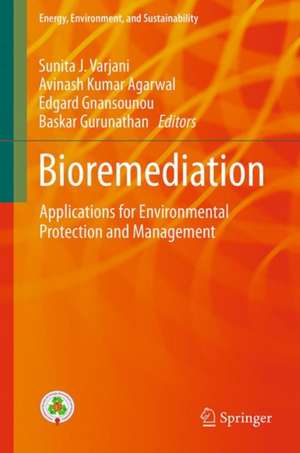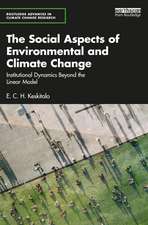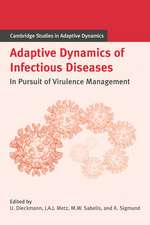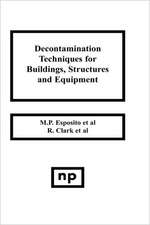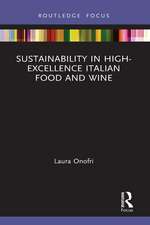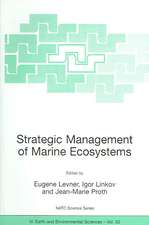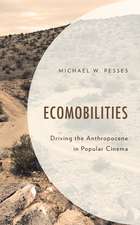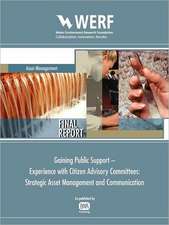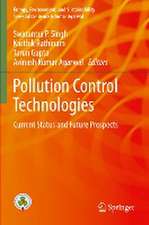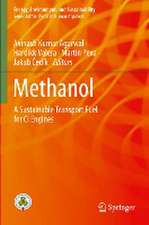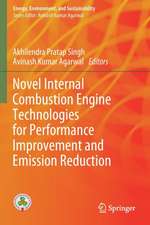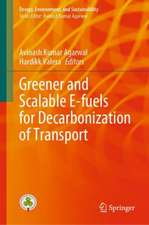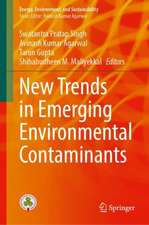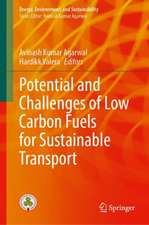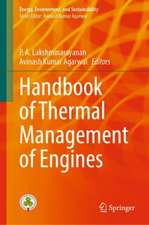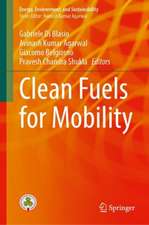Bioremediation: Applications for Environmental Protection and Management: Energy, Environment, and Sustainability
Editat de Sunita J. Varjani, Avinash Kumar Agarwal, Edgard Gnansounou, Baskar Gurunathanen Limba Engleză Hardback – 2 ian 2018
| Toate formatele și edițiile | Preț | Express |
|---|---|---|
| Paperback (1) | 1052.06 lei 38-44 zile | |
| Springer Nature Singapore – 23 dec 2018 | 1052.06 lei 38-44 zile | |
| Hardback (1) | 1231.78 lei 3-5 săpt. | |
| Springer Nature Singapore – 2 ian 2018 | 1231.78 lei 3-5 săpt. |
Din seria Energy, Environment, and Sustainability
- 18%
 Preț: 1015.70 lei
Preț: 1015.70 lei - 18%
 Preț: 1011.45 lei
Preț: 1011.45 lei - 18%
 Preț: 958.38 lei
Preț: 958.38 lei - 18%
 Preț: 900.80 lei
Preț: 900.80 lei - 15%
 Preț: 655.60 lei
Preț: 655.60 lei - 18%
 Preț: 1123.98 lei
Preț: 1123.98 lei - 18%
 Preț: 1129.65 lei
Preț: 1129.65 lei - 15%
 Preț: 643.00 lei
Preț: 643.00 lei - 15%
 Preț: 655.78 lei
Preț: 655.78 lei - 15%
 Preț: 643.34 lei
Preț: 643.34 lei - 20%
 Preț: 813.90 lei
Preț: 813.90 lei - 18%
 Preț: 1117.82 lei
Preț: 1117.82 lei - 15%
 Preț: 698.15 lei
Preț: 698.15 lei - 18%
 Preț: 955.25 lei
Preț: 955.25 lei - 18%
 Preț: 896.08 lei
Preț: 896.08 lei - 18%
 Preț: 1006.55 lei
Preț: 1006.55 lei - 18%
 Preț: 1564.85 lei
Preț: 1564.85 lei - 18%
 Preț: 1409.82 lei
Preț: 1409.82 lei - 18%
 Preț: 1218.83 lei
Preț: 1218.83 lei - 18%
 Preț: 1129.65 lei
Preț: 1129.65 lei - 18%
 Preț: 945.79 lei
Preț: 945.79 lei - 18%
 Preț: 1401.93 lei
Preț: 1401.93 lei - 18%
 Preț: 956.81 lei
Preț: 956.81 lei - 18%
 Preț: 1409.21 lei
Preț: 1409.21 lei - 15%
 Preț: 582.95 lei
Preț: 582.95 lei - 18%
 Preț: 1228.15 lei
Preț: 1228.15 lei - 18%
 Preț: 1118.75 lei
Preț: 1118.75 lei - 18%
 Preț: 956.50 lei
Preț: 956.50 lei - 24%
 Preț: 808.06 lei
Preț: 808.06 lei - 18%
 Preț: 947.50 lei
Preț: 947.50 lei - 15%
 Preț: 645.47 lei
Preț: 645.47 lei - 18%
 Preț: 1106.31 lei
Preț: 1106.31 lei - 20%
 Preț: 557.64 lei
Preț: 557.64 lei - 20%
 Preț: 563.98 lei
Preț: 563.98 lei - 20%
 Preț: 568.12 lei
Preț: 568.12 lei - 20%
 Preț: 571.28 lei
Preț: 571.28 lei - 18%
 Preț: 953.65 lei
Preț: 953.65 lei - 18%
 Preț: 1014.45 lei
Preț: 1014.45 lei - 24%
 Preț: 859.39 lei
Preț: 859.39 lei - 18%
 Preț: 962.49 lei
Preț: 962.49 lei - 20%
 Preț: 586.98 lei
Preț: 586.98 lei - 24%
 Preț: 857.03 lei
Preț: 857.03 lei - 18%
 Preț: 961.23 lei
Preț: 961.23 lei - 23%
 Preț: 1500.39 lei
Preț: 1500.39 lei - 24%
 Preț: 795.92 lei
Preț: 795.92 lei - 18%
 Preț: 951.14 lei
Preț: 951.14 lei
Preț: 1231.78 lei
Preț vechi: 1502.17 lei
-18% Nou
Puncte Express: 1848
Preț estimativ în valută:
235.69€ • 246.11$ • 194.63£
235.69€ • 246.11$ • 194.63£
Carte disponibilă
Livrare economică 25 martie-08 aprilie
Preluare comenzi: 021 569.72.76
Specificații
ISBN-13: 9789811074844
ISBN-10: 9811074844
Pagini: 510
Ilustrații: XVI, 411 p. 52 illus., 34 illus. in color.
Dimensiuni: 155 x 235 mm
Greutate: 0.85 kg
Ediția:1st ed. 2018
Editura: Springer Nature Singapore
Colecția Springer
Seria Energy, Environment, and Sustainability
Locul publicării:Singapore, Singapore
ISBN-10: 9811074844
Pagini: 510
Ilustrații: XVI, 411 p. 52 illus., 34 illus. in color.
Dimensiuni: 155 x 235 mm
Greutate: 0.85 kg
Ediția:1st ed. 2018
Editura: Springer Nature Singapore
Colecția Springer
Seria Energy, Environment, and Sustainability
Locul publicării:Singapore, Singapore
Cuprins
Introduction to Environmental Protection and Management.- Mathematical Modeling in bioremediation.- Evaluation of Next-Generation sequencing technologies for environmental monitoring in waste water abatement.- Genetically modified organisms and its impact on the enhancement bioremediation.- Integration of lignin removal from black liquor and biotransformation process.- Role of Nanofibers in bioremediation.- Bioremediation of industrial wastewater using bioelectrochemical treatment.- Biosorption strategies in the remediation of toxic pollutants from contaminated water bodies.- Bioremediation of Heavy Metals.- Pesticides Bioremediation.- Application of microbes in remediation of hazardous wastes: A review.- Phytoremediation techniques for the removal of dye in waste water.- Phenol degradation from industrial wastewater by engineered microbes.- Insect gut bacteria and their potential application in degradation of lignocellulosic biomass: a review.- Bioremediation of volatile organic compounds in biofilters.- Bioremediation of industrial and municipal waste water using microalgae.- Phytoremediation of Textile Dye Effluents.- Role of biosurfactants in enhancing the microbial degradation of pyrene.- Bioremediation of nitrate contaminated wastewater and soil.
Notă biografică
Dr. Sunita Varjani is a Scientific Officer at the Gujarat Pollution Control Board, India. She holds an M.Sc. degree in Microbiology (2009) and a Ph.D. in Biotechnology (2014). Her major areas of research are Industrial and Environmental Microbiology/Biotechnology and Molecular Biology. Dr. Varjani has authored 35 publications, including one book, 19 book chapters/reviews and 15 original research papers. She has received several awards and honours, including the Young Scientist Award at the AFRO-ASIAN Congress on Microbes for Human and Environmental Health, New Delhi (2014) and Best Paper Awards for oral presentations at national and international conferences in 2008, 2012 and 2013. Further, she serves on the editorial board of the Journal of Energy and Environmental Sustainability.
Prof. Avinash K. Agarwal joined the IIT Kanpur in 2001. His areas of interest are IC engines, combustion, alternative fuels, conventional fuels, optical diagnostics, laser ignition, HCCI, emission and particulate control, and large-bore engines. He has published 230+ international journal and conference papers. Prof. Agarwal is a Fellow of the SAE (2012), ASME (2013), ISEES (2015) and INAE (2015). He has received several awards such as the prestigious Shanti Swarup Bhatnagar Award in Engineering Sciences-2016; Rajib Goyal prize-2015; NASI-Reliance Industries Platinum Jubilee Award-2012; and INAE Silver Jubilee Young Engineer Award-2012.
Dr. Edgard Gnansounou is a Professor of Modelling and Planning of Energy Systems at the Swiss Federal Institute of Technology Lausanne (EPFL), Switzerland, where he is the Director of the Bioenergy and Energy Planning Research Group. His current research work focuses on techno-economic and environmental assessment of bio-refinery schemes based on the conversion of agricultural residues. He is leading research projects in this field in several countries including Brazil, Colombia and South Africa. In addition to publishing numerous papers in high-impact scientific journals, Dr. Gnansounou is a member of the editorial board of Bioresource Technology. He graduated with an M.S. in Civil Engineering and a Ph.D. in Energy Systems at the Swiss Federal Institute of Technology Lausanne. He has been a visiting researcher in the USA, France and India.
Dr. G. Baskar is currently working as a Professor of Biotechnology at St. Joseph’s College of Engineering, Chennai, India. He has published more than 100 papers in national and international forums, as well as five book chapters. His current research focus is on biofuels, therapeutic proteins, microbial enzymes, nanomedicine and nanocatalysis. The International Bioprocessing Association (International Forum on Industrial Bioprocesses) conferred Dr. Baskar its Young Scientist Award (2015) in recognition of his contributions in the area of Bioprocess Technology. He also received the Indian Society for Technical Education’sISTE-Sayed Sajid Ali National Award (2016) for his outstanding research work on Renewable Energy.
Prof. Avinash K. Agarwal joined the IIT Kanpur in 2001. His areas of interest are IC engines, combustion, alternative fuels, conventional fuels, optical diagnostics, laser ignition, HCCI, emission and particulate control, and large-bore engines. He has published 230+ international journal and conference papers. Prof. Agarwal is a Fellow of the SAE (2012), ASME (2013), ISEES (2015) and INAE (2015). He has received several awards such as the prestigious Shanti Swarup Bhatnagar Award in Engineering Sciences-2016; Rajib Goyal prize-2015; NASI-Reliance Industries Platinum Jubilee Award-2012; and INAE Silver Jubilee Young Engineer Award-2012.
Dr. Edgard Gnansounou is a Professor of Modelling and Planning of Energy Systems at the Swiss Federal Institute of Technology Lausanne (EPFL), Switzerland, where he is the Director of the Bioenergy and Energy Planning Research Group. His current research work focuses on techno-economic and environmental assessment of bio-refinery schemes based on the conversion of agricultural residues. He is leading research projects in this field in several countries including Brazil, Colombia and South Africa. In addition to publishing numerous papers in high-impact scientific journals, Dr. Gnansounou is a member of the editorial board of Bioresource Technology. He graduated with an M.S. in Civil Engineering and a Ph.D. in Energy Systems at the Swiss Federal Institute of Technology Lausanne. He has been a visiting researcher in the USA, France and India.
Dr. G. Baskar is currently working as a Professor of Biotechnology at St. Joseph’s College of Engineering, Chennai, India. He has published more than 100 papers in national and international forums, as well as five book chapters. His current research focus is on biofuels, therapeutic proteins, microbial enzymes, nanomedicine and nanocatalysis. The International Bioprocessing Association (International Forum on Industrial Bioprocesses) conferred Dr. Baskar its Young Scientist Award (2015) in recognition of his contributions in the area of Bioprocess Technology. He also received the Indian Society for Technical Education’sISTE-Sayed Sajid Ali National Award (2016) for his outstanding research work on Renewable Energy.
Textul de pe ultima copertă
This book examines bioremediation technologies as a tool for environmental protection and management. It provides global perspectives on recent advances in the bioremediation of various environmental pollutants. Topics covered include comparative analysis of bio-gas electrification from anaerobic digesters, mathematical modeling in bioremediation, the evaluation of next-generation sequencing technologies for environmental monitoring in wastewater abatement; and the impact of diverse wastewater remediation techniques such as the use of nanofibers, microbes and genetically modified organisms; bioelectrochemical treatment; phytoremediation; and biosorption strategies. The book is targeted at scientists and researchers working in the field of bioremediation.
Caracteristici
Highlights key advances in bioremediation technologies Provides information on the use of bioremediation technologies for environmental protection and management Contains chapters on bioremediation technologies richly illustrated with tables, figures, and examples
